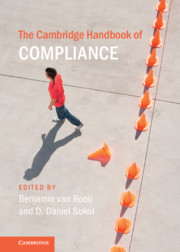Book contents
- The Cambridge Handbook of Compliance
- The Cambridge Handbook of Compliance
- Copyright page
- Contents
- Figures
- Tables
- Contributors
- 1 Introduction: Compliance as the Interaction between Rules and Behavior
- Part I Compliance Concepts and Approaches
- Part II Deterrence and Incapacitation
- Part III Incentives
- 22 Does Tort Deter? Inconclusive Empirical Evidence about the Effect of Liability in Preventing Harmful Behaviour
- 23 Crowding-Out Effects of Laws, Policies and Incentives on Compliant Behaviour
- 24 Financial Incentives for Whistleblowers: A Short Survey
- 25 Designing Corporate Leniency Programs
- 26 Incentive Contracts
- Part IV Legitimacy and Social Norms
- Part V Capacity and Opportunity
- Part VI Compliance and Cognition
- Part VII Management and Organizational Processes
- Part VIII Measuring and Evaluating Compliance
- Part IX Analysis of Particular Fields
- References
24 - Financial Incentives for Whistleblowers: A Short Survey
from Part III - Incentives
Published online by Cambridge University Press: 07 May 2021
- The Cambridge Handbook of Compliance
- The Cambridge Handbook of Compliance
- Copyright page
- Contents
- Figures
- Tables
- Contributors
- 1 Introduction: Compliance as the Interaction between Rules and Behavior
- Part I Compliance Concepts and Approaches
- Part II Deterrence and Incapacitation
- Part III Incentives
- 22 Does Tort Deter? Inconclusive Empirical Evidence about the Effect of Liability in Preventing Harmful Behaviour
- 23 Crowding-Out Effects of Laws, Policies and Incentives on Compliant Behaviour
- 24 Financial Incentives for Whistleblowers: A Short Survey
- 25 Designing Corporate Leniency Programs
- 26 Incentive Contracts
- Part IV Legitimacy and Social Norms
- Part V Capacity and Opportunity
- Part VI Compliance and Cognition
- Part VII Management and Organizational Processes
- Part VIII Measuring and Evaluating Compliance
- Part IX Analysis of Particular Fields
- References
Summary
Abstract: Whistleblower reward programmes, or ‘bounty regimes’, are increasingly used in the United States. The effectiveness of these programmes has been questioned, and empirical evidence on their effectiveness has been scarce likely due to their relatively recent introduction. In recent years, however, empirical and experimental evidence on their effectiveness has become more available and robust. We review the (rather encouraging) evidence on whistleblower reward programmes, in terms of amount of additional information generated, deterrence effects, and administration costs, and consider the possibility of extending them to accomplice witnesses in antitrust cases.
- Type
- Chapter
- Information
- The Cambridge Handbook of Compliance , pp. 341 - 350Publisher: Cambridge University PressPrint publication year: 2021
References
- 1
- Cited by



